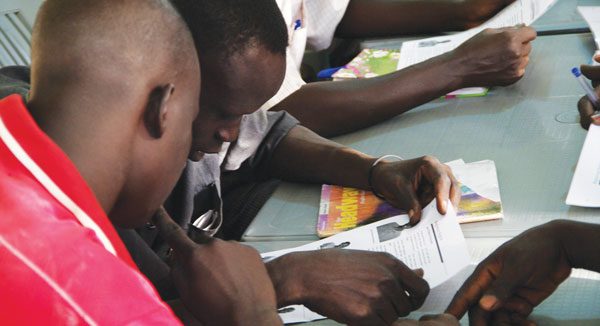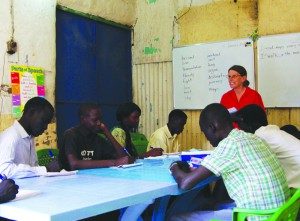The government of the new Republic of South Sudan has mandated English as the language of government and education. As Arabic has been the language of education since the mid-1960’s, this policy change creates a huge challenge for South Sudanese citizens. This is especially true in Upper Nile State, which borders Sudan.
The capital city of Upper Nile was heavily Arabized during the war years. There is a strong desire among many, especially the youth, to learn English, even though Arabic continues to be the language of wider communication. Much of the desire for English training is motivated, no doubt, by the hope of economic and/or academic gain, and may also indicate a desire for connectivity with the larger global community. It certainly offers an opportunity for fellow workers to connect with the local people and build into lives for Kingdom purposes. Following is a glimpse into some of the opportunities we had.
At the beginning of our sojourn in the capital, teachers at the nearby church-sponsored primary school, for whom Arabic was their language of education, asked us to help them strengthen their English skills. Most of these teachers started with Gail in a beginner-level class. Happily, over time and with perseverance, they grew in skill and confidence and were able to use English well in their own classrooms. Two years later, some in this group asked for additional help with their pronunciation. The one-month block course Gail developed evolved into a Bible study with these teachers that met three times a week for the next four months.

In another one of Gail’s beginning-level classes, three of her students reported, “Teacher, did you know that what you teach us in the morning we teach in the afternoon to children in another part of the city?” When we went along with these three young men one afternoon, we found a simple, well-organized school for first through seventh graders. Students came from the surrounding community, young and old alike. In addition, these three young men, secondary students themselves, consistently used our resource room for their own learning.
As a result of before- and after-class conversations with Ali (not his real name) in her intermediate class, Gail discovered that Ali had majored in French while at university, and was concerned that he was losing that language ability because he knew no French speakers in our town. We were excited to introduce him to our French-speaking friends who are mature believers. We pray this relationship will continue and our friends will have opportunity to introduce Ali to Jesus.

Easter this year gave us the opportunity to invite some of our students from another faith background to a special gathering. After we shared a meal together, our co-worker was able to explain to our guests why we celebrate Easter. Our students were listening intently.
Around the world, teaching English opens myriad opportunities for connecting with communities and individuals. As the above stories show, we found this to be true in South Sudan. Our prayer is that God will use these connections for his glory and the increase of his Kingdom.